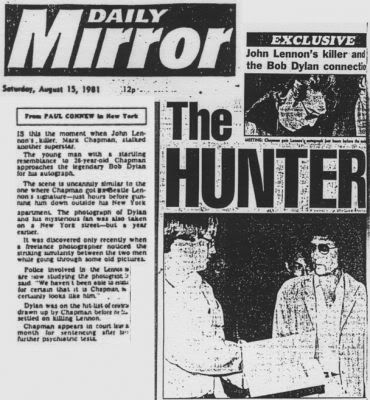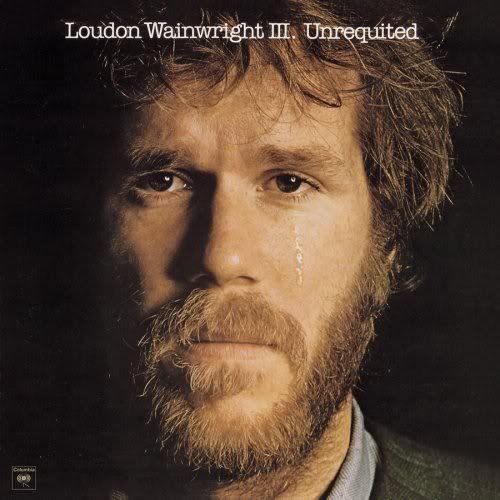
Now we come to one of the best records of Loudon's career, perhaps his second-best of the eighties. It was recorded two years after Fame and Wealth, once again on the small folk label Rounder Records. I'm Alright was recorded in London, England, and Loudon himself moved there around this time (the song "Cardboard Boxes" is about moving house, as it happens).
Loudon had produced Fame and Wealth himself, but perhaps realizing that the sound of that album wasn't too great, he invited Richard Thompson on board again, this time as producer as well as session man. The result is a much cleaner sound, though equally stripped down. (Ironically, Thompson's own albums at this time suffered from misguided attempts by other producers to give them an eighties sheen; he might have been better off producing his own records.) As was noticeable with Fame and Wealth, Loudon has given up attempts to be a rocker, having parodied his efforts in "Watch Me Rock, I'm Over Thirty" (on Final Exam, as we saw.)
The opening song of I'm Alright is in fact the lonely acoustic troubador song par excellence. It is ironic, then, that many people today probably know it best in a lush band arrangement with harmony vocals. Yes, it's One Man Guy, the song Rufus appropriated from his Dad and now everyone thinks is his own.
I'm not denying that Rufus's version is sweet on the ear, or that there isn't a curious Oedipal thing going on, with Rufus apparently going against the grain of the lyric by suggesting that whatever Loudon may be, he, Rufus, is not a miserable, selfish loner. That, at least is the impression given by his use of Richard's son Teddy and his own sister Martha on vocal harmonies. How can he be a one-man guy with his best mate and loving sis behind him?
Thus Rufus's version, however sweet, doesn't interpret the lyrics so much as reject their message. This is another of Loudon's loner songs, simultaneously celebrating and recoiling from his motel room existence and his alley cat ways (check out "Motel Blues", "Ingenue", and several others). The song confesses the selfishness of this kind of existence, while clinging to it, even revelling in it. It suggests that the only thing we can depend on and trust is ourselves:
these three cubic feet of bone and blood and meat are all I love and know
Perhaps no one since Philip Larkin has been this honest about the selfish pleasures of the single life.
Thus as a son's gift to a father, Rufus's version is ambiguous, to say the least. Nevertheless, royalties on "One Man Guy" must represent one of Loudon's biggest ever pay days (after "Dead Skunk" and Johnny Cash's cover of "The Man Who Could Not Cry").
The song is written to be sung live at one of Loudon's endless solo shows:
People will know when they come to the show
What kind of a guy I am
They'll understand what I stand for
And what I just can't stand
Great word play, that! And a perfect concert-opener.
Here you can see Loudon perform the song:
And here is Rufus's very different interpretation:
The next song, Lost Love, is a breakup song without an apparent personal angle, it being highly stylized in the manner of a Noel Coward song or something from that era. I'm very fond of it, however untypical of Loudon it may be. There is some great wordplay again.
I've noticed that you never call me "darling", darling
I understand the reason wh-hy-hy-hy
There is no reason why you should call me "darling", darling
Leave love alone and let it die.
The middle part is more like the Loudon we know and are distinctly ambivalent about, however (see "Mr. Guilty" and the later "So Damn Happy"):
I'm not completely sure I'm sorry, darling
When I get angry, then I'm glad
I'M HAPPY THAT IT'S FINALLY OVER
[lapsing back into Noel Coward mode) But when I'm not glad, I'm sad.
As with his country pastiches on Final Exam you wish Loudon would write a little more in this jazz-lounge vein.
Then we have the blues parody, I'm Alright, the title track. Loudon introduces it in concert as the "happy blues." Those old black guys certainly make you think the bottom of their world has fallen out now that their baby darn left them, but a middle class white guy like Loudon can't be that unselfconsciously solipsistic, so on the whole you believe him when he says he's "all right without you", though there may be an element of protesting too much. The performance of the song below is prefaced by an interview with Loudon in which he explains that the album was originally going to be called One Man Guy, but his agent persuaded him that the record-buying public would think he was gay, so he changed it... The performance is a good example of the visual and physical element of Loudon as a performer: lots of spastic gestures and weird facial contortions.
In another interview excerpt shown after the performance of the song in the above video, Loudon says that he was originally drawn to the idea of making it clear that the singer is not "all right" after all; but in the end he was drawn to the comedy ending with the dental floss....
After those thematically linked songs comes a Loudon song about someone else (notice how these are becoming more infrequent as we go on? Not John is about the death of John Lennon five years earlier. It's a sincere tribute, though Loudon cannot resist an irreverent pun:
John Lennon and his wife Yoko - Oh No
youttube offers us a video montage together with the album performance of this song:
Incidentally, loser assassin Michael David Chapman may have been stalking a different victim 12 months earlier:

Cardboard Boxes is about moving house, as already stated, a nice semi-acoustic number with some great drumming.
Screaming Issue is a song written to Loudon's daughter by the singer Suzzy Roche (member of the family vocal group The Roches), who was born (judging by the song's lyrics) the previous Christmas. There would be another daughter (Lexie Kelly) by another woman later, so that it is sometimes difficult to be sure who these Wainwrights are singing about (Rufus has said that "Little Sister" is not about Martha, so is it about Lucy or Lexie?) At least there is no mistaking for whom this song is intended as Loudon mentions Lucy by name. The title puns, of course, on two senses of "issue." Delicate and beautiful.
Next we have one of Loudon's edgy funny songs, about the questions journalists always ask anyone who still has the temerity to outstay their welcome in the music business: How Old Are You?
The questions range from the nasty and impertinent:
How come you don't try to write a novel?
How come you don't try to write a play?
Isn't it time you died or retired?
Why the hell won't you just go away?
How old are you, are you crazy?
How old are you, are you really a drunk?
Are you bitter, have you grown lazy?
Were you embarrassed about "Dead Skunk"?
to ones that Loudon probably wonders about himself:
How come you didn't get big like Bob Dylan?
How come you didn't get big like Springsteen?
Were you unable or were you unwilling?
Tell us the truth about it, come on, come clean!
(Nice guitar by Richard Thompson, by the way!)
Then there is the utterly charming Animal Song, about the noises that animals make. A children's song. I don't trust the performer who never records at least one of those. Here's Loudon performing the song (followed by 'Five Years Old) live in 1987:
Out of This World is a hopeful song looking forward to the next life. Daddy Take A Nap is a slightly annoying brass band stomp with mildly amusing lyrics written from a child's point of view. Ready or Not (So Ripe) is an optimistic sounding song I've never got my head around.
The album closes quietly with Career Moves, which looks back over Loudon's career in the music business and as an entertainer with a lot of quiet pride:
For 20 odd years I have strummed on guitars
5,000 lost flat picks, four fingertip scars
I must have broken a million g strings
Picking and strumming, and playing these things
Banging and tunin', and playing these things.
And it's been 16 years now that I've written songs
Over a 100 and still growing strong
About drinking and hockey and flying above
Again and again about unhappy love
Over and over, unhappy love.
And it's music for money, but I'll do it for fun
Oh, I know how to do it, it's easily done
To stand on a stage doesn't make me afraid
I'm comfortable up there, it's gotten me laid
It always amazes me when I get paid.
So here am I doing all that I can do
You're paying, I'm playing, I'm grateful to you
Indoors and outdoors, at home and abroad
I sing these songs and you people applaud.
You haven't changed much, you still applaud.
With that obvious cue to the audience in the last line, it will be seen that the album is framed by two songs that seem written to order for Loudon's live shows. Moreover, "Career Moves" is Loudon's answer to some of the questions the hostile journalists ask in How Old Are You?, in particular, why he still sings and why he won't quit the business.
Here's Loudon singing "Career Moves" live on British TV in 1993:
You'll have to supply the applause yourself on cue!
I'm Alright was nominated for a grammy. It goes without saying that it didn't win...
Note: Scandalously, this fine album appears at time of writing to be out of print, with Amazon.com asking nearly $50.00 for a second-hand copy! Ordinarily I would not recommend that anyone download an mp3 copy of the album (that's against the whole ethos of these threads, which aim to present the artistic integrity of the LP/CD medium), but should you wish to support the artist, you can do so here: http://www.amazon.com/Im-Alright/dp/B000UDQ5VK/ref=dmusic_cd_album



